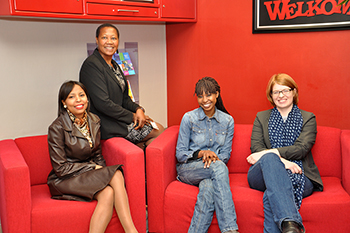Latest News Archive
Please select Category, Year, and then Month to display items
03 March 2021
|
Story Giselle Baillie
|
Photo Supplied
_web.jpg?sfvrsn=987e6620_1) Residence members who led the project, included:
Bohlokwa Rantja, the Residence Prime, and Transformation Committee members Nsuku Mutemela, Ofentse Motlakeng, Phindile Tjale, Madinku Mabala, Mmapopi Motshoso, Karabo Shuping, and Tagane Sekete.
Residence members who led the project, included:
Bohlokwa Rantja, the Residence Prime, and Transformation Committee members Nsuku Mutemela, Ofentse Motlakeng, Phindile Tjale, Madinku Mabala, Mmapopi Motshoso, Karabo Shuping, and Tagane Sekete.
The University of the Free State (UFS) Council approved and adopted Lehakwe House as the new name for the
NJ van der Merwe residence on the Bloemfontein Campus. The approval on 26 November 2020 followed a lengthy process of deliberation, consultation, and public engagement that has taken place since November 2019 and is aligned with the UFS Policy on Naming and Renaming. The name-change process was initiated by the Prime and Transformation Committee of the residence, guided by the
Unit for Institutional Change and Social Justice and supported by a multi-stakeholder committee representative of the residence, the Housing and Residence Affairs Office, the Department of Student Affairs, the Student Representative Council, and alumni.
Lehakwe – a precious gem
Following a lengthy evaluation process of the names submitted through a public voting and recommendation platform in July 2020, ‘Lehakwe’ – a Sesotho word referring to a ‘precious gem’ – emerged as the front runner. As many current and past members of the residence attest, this womxn’s residence has come to occupy a significant space within the hearts and minds of UFS students and the UFS community, given that its spirit has always been closely aligned with the constitutional values of dignity, equality, and freedom and with the human values of ubuntu. In this vein, the new name of ‘Lehakwe’ presents a consolidation of constitutional and university values into the day-to-day thinking, learning, living, and legacy spaces of students, as well as everyone who interacts and engages with the UFS.
UFS outperforms SA higher education in EU-Saturn programme
2016-12-14

Partnering between the UFS and other institutions
makes it possible for staff and students to study abroad.
Pictured from left front, are: Mareve Biljohn (EU-Saturn
at University of Groningen), Memory Mphaphuli (INSPIRE
at University of Ghent) and Wanda Verster (EU-Saturn at
Uppsala University). Back: Moliehi Mpeli (Erasmus Mundus
at University of Leuven).
Photo: Stephen Collett
The University of the Free State (UFS) strives to invest in its staff and students and a proven example can be seen in the latest cycle of the Erasmus Mundus EU-SATURN programme.
The UFS outperformed the higher education sector over the past five years as it had more exchange scholarships than most South African universities. A total of 16 (18%) out of the 89 local scholarships allocated until 2016 were from UFS. Stellenbosch University, with 14 scholarships, was second.
University one of main roleplayers
Chevon Jacobs, Senior Officer said: “Internationalisation at the UFS is a great achievement as the university allocated all available scholarships to eligible staff and students. She said the strong partnership history between the university and some European institutions, due to a similarity between the language and culture of especially Dutch-speaking countries, is one of the reasons for the success.
“We are very proud of our participation. We have invested for these predominantly young members to spend time abroad in furthering their qualifications,” she said.
The EU-Saturn project has been jointly co-ordinated for the past five years by the University of Groningen, Netherlands, and the UFS.
One of few projects funded by Erasmus Mundus
The Erasmus Mundus is an international partnership aimed at enhancing the quality of European higher education and the promotion of dialogue and understanding between people and cultures through co-operation with other countries. The EUROSA, EU-Saturn, Aesop and INSPIRE to name a few, are all programmes funded by the European Union through the Erasmus Mundus. These projects offer fully funded part-time or full-time postgraduate scholarships for study in Europe.
Some of the universities UFS students have studied at are the University of Groningen, the University of Newcastle, England, and the University of Ghent, Belgium.
Successful UFS grantees awarded scholarships over the past five years:
• Maria Campbell (2014 – PhD) – University of Newcastle
• Sethulego Matebesi (2014 – PhD) – Uppsala University
• Lindie Koorts (2016 – PhD) – University of Groningen
• Reginald Makgoba (2013/2014 – Master’s) – University of Newcastle
• Sanet Steyn (2013/2014 – Master’s) – University of Groningen
• Johnathan Adams (2015/2016 – Master’s) - Göttingen University
• Eben Coetzee (2013/2014 - PhD) – University of Groningen
• André Janse van Rensburg (2013/2014 – PhD) – University of Ghent
• Martin Rossouw (2013-2015 – PhD) – University of Groningen
• Jan Schlebusch (2013-2016 – PhD) – University of Groningen
• Carel Cloete (2014-2016 – PhD) – University of Groningen
• Nadine Lake (2014-2016 – PhD) – Uppsala University
• Elbie Lombard (2014-2016 – PhD) – University of Ghent
• Luyanda Noto (2014/2015 – PhD) – University of Ghent
• Mareve Biljohn (2015/2016 – PhD) – University of Groningen
• Wanda Verster (2015/2016 – PhD) – Uppsala University